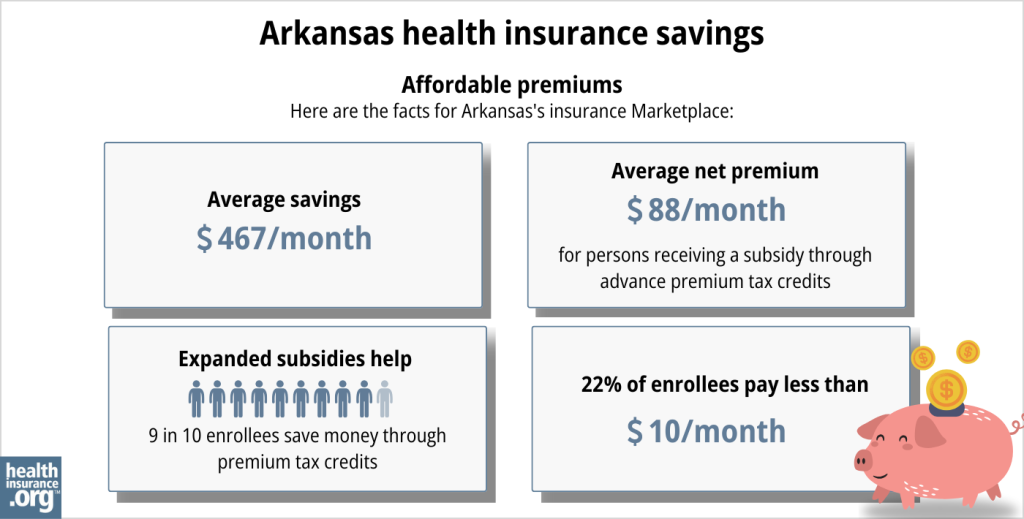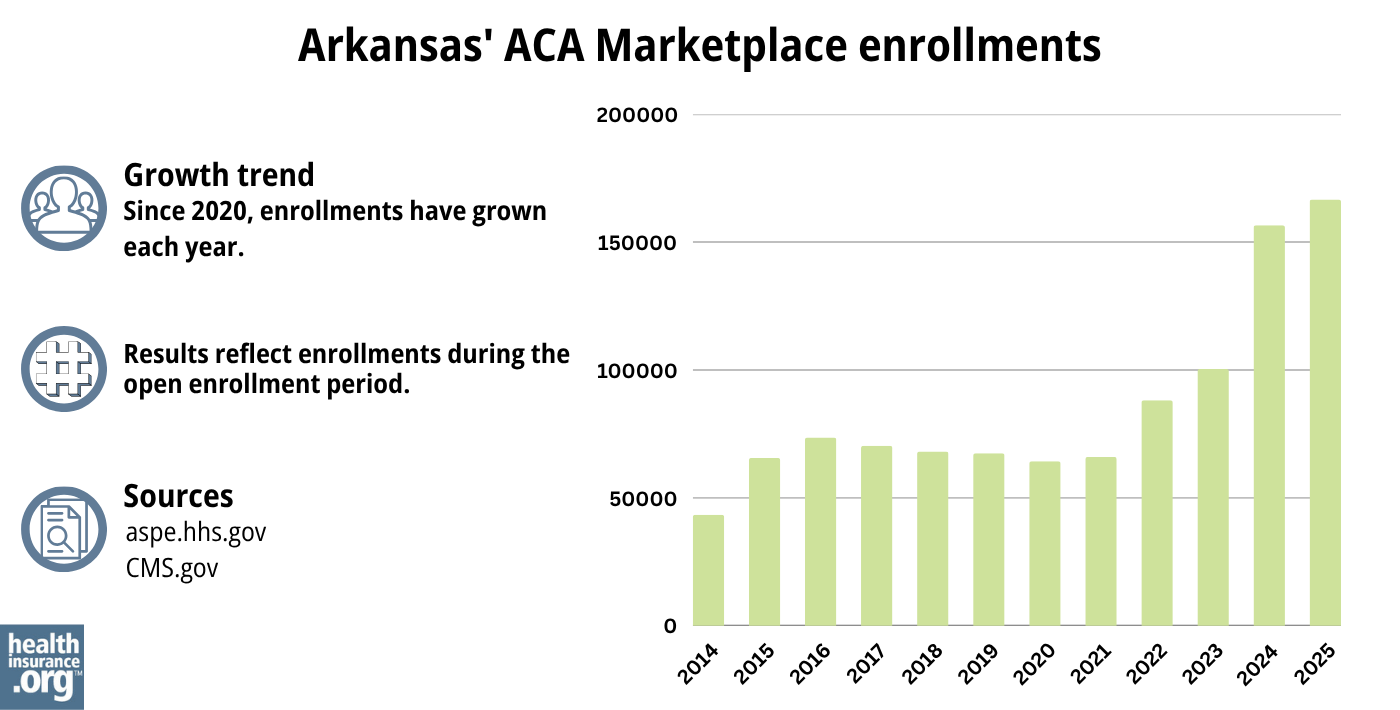Home > Health insurance Marketplace > Arkansas
Arkansas Marketplace health insurance in 2025

Compare ACA plans and check subsidy savings from a third-party insurance agency.

Arkansas health insurance Marketplace guide
We designed this guide, including the FAQs below, to help you understand your health insurance coverage options in Arkansas. For many people, an Affordable Care Act (ACA) Marketplace plan – also called Obamacare – is a cost-effective choice.
Arkansas residents enroll in ACA-compliant plans through a state-based exchange/Marketplace that utilizes the federal enrollment platform (SBE-FP). This means people enroll through HealthCare.gov, but the state (via the Arkansas Insurance Department) oversees the exchange plans and runs its own outreach and assistance programs.3 Arkansas has used this approach since 2016.
Six private insurers offer plans through the Arkansas Marketplace, and all of them plan to continue to offer coverage in 2025 (see rate change details below).
Arkansas also purchases Marketplace health plans for people who are eligible for expanded Medicaid.
Frequently asked questions about health insurance in Arkansas
Who can buy Marketplace health insurance?
To be eligible for health coverage through the Arkansas Marketplace, you must meet certain criteria. Typically, you can apply if you:4
- Reside in Arkansas
- Are either a U.S. citizen, U.S. national, or lawfully present in the U.S.
- Are not incarcerated
- Are not enrolled in Medicare
So most Arkansas residents are eligible to enroll in a Marketplace plan. However, a more important question for most people is whether they’re eligible for financial assistance (premium subsidies and cost-sharing reductions) in the Marketplace.
Eligibility for financial assistance depends on your income. In addition, to qualify for financial assistance with your Marketplace plan you must:
- Not have access to affordable employer-sponsored health insurance. If your employer offers coverage but you feel it’s too expensive, you can use our Employer Health Plan Affordability Calculator to see if you might qualify for premium subsidies in the Marketplace.
- Not be eligible for Medicaid or CHIP.
- Not be eligible for premium-free Medicare Part A 5
- File a joint tax return with your spouse, if you’re married.6 (with very limited exceptions)7
- Not be able to be claimed by someone else as a tax dependent.6
When can I enroll in an ACA-compliant plan in Arkansas?
The open enrollment period to buy individual and family health coverage in Arkansas runs from November 1 to January 15. Here are some key dates:8
- November 1: Open enrollment starts! This is when you can first sign up for or change plans for the 2024. If you enroll by December 15, your coverage will start on January 1.
- December 15: Last day to enroll or change plans to start on January 1. After this date, any changes or new plans won’t start until February 1.
- January 15: Open enrollment ends. After this, you only change or enroll in coverage through a special enrollment period (SEP).
An SEP allows you to make plan changes outside open enrollment if you’ve had a qualifying life event, like getting married, having a baby, or losing other health coverage.9
But some people can sign up without a qualifying life event. For example:
- Native Americans can enroll in Marketplace plans year-round.
- People eligible for subsidies with income under 150% of the poverty level can enroll anytime.
- People who lose Medicaid/CHIP between March 31, 2023 and November 30, 2024 are eligible for a temporary extended SEP.10
How do I enroll in a Marketplace plan in Arkansas?
If you’re eligible for an ACA Marketplace plan, you can enroll:
- Online through HealthCare.gov
- By phone at (800) 318-2596
- With the help of a local insurance agent/broker, Navigator, or certified application counselor
- Via an approved enhanced direct enrollment entity.11
How can I find affordable health insurance in Arkansas?
You can find affordable health plans in Arkansas on the ACA Marketplace (HealthCare.gov).
As of early 2024, 93% of Arkansas Marketplace enrollees were receiving advance premium tax credits (APTC, or premium subsidies). The average subsidy amount was about $477/month, leaving the average enrolling paying only about $119/month for their coverage; that average includes the 7% who paid full price.12
(The numbers above are based on effectuated enrollment. The graphic below uses data from all applications submitted during open enrollment, and also shows some different metrics.)

Source: CMS.gov13
If your income isn’t more than 250% of the federal poverty level, you may also qualify for cost-sharing reductions (CSR) to lower your deductibles and out-of-pocket costs.14
You may enroll in Medicaid coverage if eligible. Arkansas expanded Medicaid under the ACA, and the state purchases Marketplace health plans for people who are eligible for expanded Medicaid.
Short-term plans can be a lower-cost coverage option for people not eligible for Medicaid, Medicare, or subsidized Marketplace coverage. But it’s important to understand the drawbacks of short-term coverage before purchasing it, as these plans are not regulated by the ACA.
How many insurers offer Marketplace coverage in Arkansas?
The Arkansas exchange/Marketplace offers individual and family health plans from six insurers, although some are subsidiaries or licensees of a single parent entity.
Octave (USAble HMO, Inc.) was new to the Arkansas Marketplace for 2024, and will continue to offer plans in 2025.15
Are Marketplace health insurance premiums increasing in Arkansas?
The Arkansas Insurance Department announced the following approved average rate changes for 2025,16 which amount to a weighted average increase of 6.2%, before subsidies are applied.17
Arkansas’ ACA Marketplace Plan 2025 APPROVED Rate Increases by Insurance Company |
|
|---|---|
| Issuer | Percent Increase |
| Celtic Insurance Company (Ambetter) | 10.9% |
| HMO Partners, Inc (Health Advantage) | 5.8% |
| QCA Health Plan, Inc. | 2.2% |
| QualChoice Life and Health Insurance Company, Inc. | 3.8% |
| USAble Mutual Insurance Co. (AR Blue Cross & Blue Shield) | 3.17% |
| USAble HMO, Inc. (Octave) | 7.7% |
Source: Arkansas Insurance Department16
The average rate changes are for full-price premiums. But most people in Arkansas receive subsidies to lower their costs, so their rate change may be different.18
For perspective, here’s an overview of how unsubsidized average premiums have changed in Arkansas over the years:
- 2015: Average decrease of 2%.19
- 2016: Average increase of 4.4%.20
- 2017: Average increase of 9.1%.21
- 2018: Average increase of 17.5%.22
- 2019: Average increase of 4.1%.23
- 2020: Average increase of 2.3%.24
- 2021: Average increase of 3.4%.25
- 2022: Average increase of 4.4%.26
- 2023: Average increase of 5.9%.27
- 2024: Average increase of 4.1%.28
How many people are insured through Arkansas’ Marketplace?
During the open enrollment period for 2024 coverage, a record-breaking 156,607 people enrolled in private plans through the Arkansas Marketplace.29 (See chart below with historical enrollment data.)
That came on the heels of a previous record high the year before, when just over 100,000 Arkansans signed up for private health plans through the ACA Marketplace.18
The enrollment growth in recent years was driven in large part by the American Rescue Plan’s subsidy enhancements, which have been extended through 2025 by the Inflation Reduction Act. These subsidy enhancements make coverage more affordable than it was before 2021.
The enrollment spike in 2024 was also partially due to the “unwinding” of the pandemic-era Medicaid continuous coverage rule. Medicaid disenrollments resumed in the spring of 2023, and Arkansas had completed the unwinding process by October 2023, with more than 427,000 people disenrolled from Medicaid.30
HealthCare.gov is offering an extended special enrollment period, through November 2024, for people disenrolled from Medicaid during the unwinding period.10 But by April 2024, nearly 65,000 people had transitioned from Arkansas Medicaid to a private plan offered in the Arkansas Marketplace,31 helping to drive 2024 enrollment higher than it had been in recent years.

Source: 2014,32 2015,33 2016,34 2017,35 2018,36 2019,37 2020,38 2021,39 2022,40 2023,41 2024,42 202543
What health insurance resources are available to Arkansas residents?
HealthCare.gov
This is the ACA Marketplace where you can enroll in a health insurance plan online. You may also get help by calling (800) 318-2596.
Arkansas Center for Health Improvement
Nonprofit focused on improving healthcare access and public health in Arkansas.
Arkansas Insurance Department Consumer Services Division
Regulates insurance companies and assists consumers. Can help with health insurance questions, complaints, and more.
ARKids First
Arkansas’ Children’s Health Insurance Program. Provides low-cost health coverage for children in families who earn too much for Medicaid but can’t afford other insurance.
Arkansas Senior Health Insurance Information Program
Provides local Medicare counseling and assistance. Can help answer questions, resolve issues, and enroll in Medicare plans.
Louise Norris is an individual health insurance broker who has been writing about health insurance and health reform since 2006. She has written dozens of opinions and educational pieces about the Affordable Care Act for healthinsurance.org.

Looking for more information about other options in your state?
Need help navigating health insurance options in Arkansas?
Explore more resources for options in Arkansas including short-term health insurance, dental insurance, Medicaid and Medicare.
Speak to a sales agent at a licensed insurance agency.
Footnotes
- ”2025 OEP State-Level Public Use File (ZIP)” Centers for Medicare & Medicaid Services, Accessed May 13, 2025 ⤶ ⤶
- ”Rate Review Submissions” RateReview.HealthCare.gov. Accessed Jan. 7, 2025 ⤶
- My Arkansas Insurance. Arkansas Insurance Department. Accessed November 2023. ⤶
- ”A quick guide to the Health Insurance Marketplace” HealthCare.gov ⤶
- Medicare and the Marketplace, Master FAQ. Centers for Medicare and Medicaid Services. Accessed November 2023. ⤶
- Premium Tax Credit — The BasicsInternal Revenue Service. Accessed February 2024. ⤶ ⤶
- Updates to frequently asked questions about the Premium Tax Credit. Internal Revenue Service. February 2024. ⤶
- “When can you get health insurance?” HealthCare.gov, 2023 ⤶
- “Understanding special enrollment periods” CMS.gov, March 2023 ⤶
- ”HHS Takes Additional Actions to Help People Stay Covered During Medicaid and CHIP Renewals” CMS Newsroom. Mar. 28, 2024 ⤶ ⤶
- “Entities Approved to Use Enhanced Direct Enrollment” CMS.gov, April 28, 2023 ⤶
- ”Effectuated Enrollment: Early 2024 Snapshot and Full Year 2023 Average” CMS.gov, July 2, 2024 ⤶
- “2025 Marketplace Open Enrollment Period Public Use Files” CMS.gov, May 2025 ⤶
- ”APTC and CSR Basics” Centers for Medicare and Medicaid Services. June 2023. ⤶
- ”Health Insurance Rate Changes for 2025” Arkansas Insurance Department. Accessed July 29, 2024 ⤶
- ”Health Insurance Rate Changes for 2025” Arkansas Insurance Department. Accessed Sep. 19, 2024 ⤶ ⤶
- ”Arkansas: *Final* avg. unsubsidized 2025 #ACA rate changes: +6.2% (updated)” ACA Signups. Sep. 19, 2024 ⤶
- “2023 Marketplace Open Enrollment Period Public Use Files” CMS.gov, March 2023 ⤶ ⤶
- 2015 Projected Qualified Health Plan Individual Premium Rates for Arkansas. Arkansas Insurance Department. Accessed November 2023. ⤶
- Arkansas: Approved 2016 Rate Hikes Confirmed At 4.4% Weighted Avg. ACA Signups. August 2015. ⤶
- Avg. UNSUBSIDIZED Indy Mkt Rate Hikes: 25% (49 States + DC). ACA Signups. October 2016. ⤶
- 2018 Rate Hikes. ACA Signups. October 2017. ⤶
- Arkansas: APPROVED 2019 ACA Rate Hikes: 4.1%, But Would Have DROPPED By ~1% W/Out #ACASabotage. ACA Signups. August 2018. ⤶
- Arkansas: *Approved* Avg. 2020 #ACA Exchange Rate Changes: 2.3% Increase. ACA Signups. September 2019. ⤶
- Arkansas: Approved Avg. 2021 #ACA Rate Changes: +3.4% Indy Market, -0.4% Sm. Group Market. ACA Signups. October 2020. ⤶
- Arkansas: Approved Avg. 2022 #ACA Premium Rate Changes: +4.4% Indy Market; +4.0% Sm. Group. ACA Signups. October 2021. ⤶
- Arkansas: (Updated) Final Avg. Unsubsidized 2023 #ACA Rate Changes: +5.9%. ACA Signups. July 2022. ⤶
- Arkansas *Final* Avg. Unsubsidized 2024 #ACA Rate Changes: +4.1%. ACA Signups. September 2023. ⤶
- ”Marketplace 2024 Open Enrollment Period Report: Final National Snapshot” Centers for Medicare and Medicaid Services. January 2024. ⤶
- Unwinding data for April, May, June, July, August, and September. Arkansas Department of Human Services. Accessed December 2, 2023. ⤶
- HealthCare.gov Marketplace Medicaid Unwinding Report. Centers for Medicare and Medicaid Services. Data through April 2024, Accessed Aug. 3, 2024 ⤶
- “ASPE Issue Brief (2014)” ASPE, 2015 ⤶
- “Health Insurance Marketplaces 2015 Open Enrollment Period: March Enrollment Report”, HHS.gov, 2015 ⤶
- “HEALTH INSURANCE MARKETPLACES 2016 OPEN ENROLLMENT PERIOD: FINAL ENROLLMENT REPORT” HHS.gov, 2016 ⤶
- “2017 Marketplace Open Enrollment Period Public Use Files” CMS.gov, 2017 ⤶
- “2018 Marketplace Open Enrollment Period Public Use Files” CMS.gov, 2018 ⤶
- “2019 Marketplace Open Enrollment Period Public Use Files” CMS.gov, 2019 ⤶
- “2020 Marketplace Open Enrollment Period Public Use Files” CMS.gov, 2020 ⤶
- “2021 Marketplace Open Enrollment Period Public Use Files” CMS.gov, 2021 ⤶
- “2022 Marketplace Open Enrollment Period Public Use Files” CMS.gov, 2022 ⤶
- “Health Insurance Marketplaces 2023 Open Enrollment Report” CMS.gov, 2023 ⤶
- ”HEALTH INSURANCE MARKETPLACES 2024 OPEN ENROLLMENT REPORT” CMS.gov, 2024 ⤶
- “2025 Marketplace Open Enrollment Period Public Use Files” CMS.gov, May 2025 ⤶

